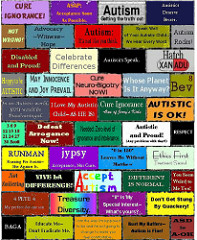“Repetition does not transform a lie into a truth.”
~ Franklin D. Roosevelt
Few things in life get me so riled up as people who go around preying upon the desperate, confused, earnest, and/or scientifically illiterate. These nuts are found in every sphere of life, from those selling tonics guaranteed to make your garden perfectly green, free of pests, full of flowers, blahblahblah, to those selling tonics to “cure” ADD, autism, or any number of neurological differences that are simply hard-wired into the development of the brain (and hence, are neither diseases nor curable).
The quacks rely on a variety of fallacies and disingenuous ploys, by appealing to emotions, asserting that anecdotes are the same thing as proof, neatly sidestepping the overwhelming evidence that refutes their bullshit, and worse, they will sometimes seek to instill fear and mistrust of sources that do provide accurate, multiply verifiable science-based information. At best these “cures” are innocuous, and merely a waste of money. Sometimes they are downright dangerous, and people die from these unproven, mis-used and sometimes even un-tested treatments!
I originally wrote the following for a magazine, back in 2004. Sadly, nothing has changed; the words are just as valid now as they were then…
About once a year I like to do an article on Gardening Myths. This time, instead of telling you which things are nonsense, I thought I would share some tips to help you identify nonsense for yourself.
Sometimes false claims are made for the purpose of selling something. The seasoned gardener can usually pick up on these and cast a jaundiced eye over the claims. It is the “newbies” (novices) who often get suckered in.
Sometimes false claims are made over the fence, or are passed along as earnest and well-meaning gospel truth, but are not based on facts. Sometimes several facts get misunderstood and are conflated into nonsense. These latter two are the tricky sort that are harder to identify, especially for those people who only learn “rules” about What to do rather Why to do it. Without understanding how things really work, or the rationale behind doing something a certain way, the discrepancies are hard to recognize.
Can the claims be verified?
Watch out for “secret” formulas that are not tested, or have only been tested by the person selling them. One of the central concepts to good science is reproducibility: if the other factors are the same, anybody should be able to get pretty much the same results.
Extraordinary claims require extraordinary proof.
Likewise, just because we do not know how or why something works does not mean that somebody’s wild explanation is true – there may be many [more] sensible reasons how or why. Usually the true answer is the simplest explanation (this “keep it simple” approach to explanations is known as Occam’s Razor). Extraordinary claims often have verbiage like: “unbelievable”, “miracle”, “works like magic”, “wonder”, “shocking”, “astonishing” and so on.
Correlation does not equal causality.
This is from whence many of those over-the-fence pieces of nonsense originate. One event is observed, and another event is observed, and someone assumes that the first event is the cause of the second one. Sometimes this is true, but often it is not. For a simple example, there is old joke that “washing your car makes it rain”, which is an entertaining joke because many of us have washed our cars, then seen it rain and gotten the resultant mud on our formerly-clean vehicles. However, every single day there are cars washed, but it does not rain every day.
For a more down to earth example: a friend tells you, “Oh, I planted garlic next to my roses last year, and I did not have any aphids on them!” There could be many reasons why our (well-intended but confused) organic-minded rose grower did not have aphids on her roses: she was using a weekly natural fungicide treatment on her roses and washed off the few aphids that had started to colonize the plants, or perhaps her avoidance of pesticides allowed the natural enemies to survive and keep the aphid population down, or maybe it was simply a year with a low population of rose aphids! In other words, the supposed cause (planting garlic nearby) may have had nothing at all to do with the supposed effect [no rose aphids].
Very similar to the first two is Mere anecdotes are not scientific proof.
One or two examples — or even several – are not enough to prove something. This is especially true if the results are not compared to controls. You cannot be sure that the results are due to the variable being tested. For example, you decide to plant antacids in your soil along with all of your tomatoes. Your neighbor Joe also tries the same thing. Neither of you get any blossom-end rot on your tomatoes, happy-happy-joy-joy! You tell all of your garden club friends; after all, neighbor Joe did it too – it must be true, right? Gee, are antacids the cure for blossom-end rot (BER)? Not really. Although BER is caused by a calcium deficiency in the fruit, it is usually the result of a younger tomato plant trying to grow vines and fruits at the same time, and the calcium gets allocated to vine growth instead of the fruits. Actually, most of the local soils are not deficient in calcium (the limestone rocks that riddle our soils are calcium carbonate). Also, there are some varieties of tomato plants that are genetically much less prone to BER than others. BER is also more likely when the soil moisture is inconsistent. And not surprisingly, once plants get a little older and focus growth more on fruits instead of vines, the BER generally disappears.
If you wanted to test the antacid theory, you could plant a bunch of tomatoes, all the same variety, with half of the plants being randomly selected for planting antacids and half not. If antacids really “cured” BER, then we would expect to see that the plants with the antacids do not have BER on the fruits, and the plants without do have BER on the fruits. By using the same tomato cultivar, you know that it is not the cultivar itself that provides the resistance. And if you tested this over several years, you would also know that the weather was not a factor in BER (e.g. inconsistent moisture). If you did the test in several fields with different natural levels of soil calcium [as determined by a soil test before planting], you could test if the antacids provided supplemental calcium for the plants.
Beware of jargon, statistics, and mixtures of fact and fancy.
Big scientific-sounding words and claims with lots of numbers may sound impressive (especially if you do not have a strong background in that particular scientific field), but that is not the same thing as being grounded in good science.
Another common ploy is to sprinkle in some true scientific facts that everyone can recognize, because then people will assume that the things they do not recognize must also be true. Or, a book with many totally erroneous techniques/claims may also have a lot of perfectly true facts in it. Likewise, a catalog may have a complement of perfectly common, sensible products as useful filler to boost the claims of the “special” products.
An alternate tactic is to play up fears of science and technology, and try to sell you ideas or things from an anti-science or nostalgic angle. Look for phrases like, “down-home”, “back to earth”, “old-timey”, “forgotten”, “secrets of the ancient”, “long-lost” and so on.
Does the information come from a reliable source? Does the source claim Expert, Professional or Master status? Does the source claim to have knowledge that no one else does OR wants to sell you knowledge that “others don’t want you to know”?
Anybody can claim a title to sound impressive. People who have special knowledge will have the credentials from independent sources (not merely their own say-so) to back it up.
There is a wonderful thing about special knowledge; in the scientific world, people share new information! They submit their results to journals and the articles are reviewed by their peers as a check to help make sure that what goes into print is true. Granted, this process isn’t perfect (human beings are fallible); once in a great while a retraction has to be made, which is embarrassing to everyone involved. But it is the nature of science to be self-correcting. When new information is discovered, previous theories are tested, and sometimes theories have to be changed to reflect the new understanding.
Likewise, there are very few fields of knowledge where the information is held as closely-guarded secrets to be kept from others (research by companies that are in the process of acquiring patents is one of these such exceptions). In real life, the “experts” don’t want to keep knowledge a secret, they want to share it with everyone! This is why we have so many science journals, magazines, textbooks, how-to books, classes and lectures, television shows, et cetera. If someone is trying to sell you “special” information, remember that they are trying to $ell you something – which may not necessarily be “special” at all.
But, you don’t have to take my word for all these facts and fallacies … check things out for yourself!








Wanda said,
26 December 2007 at 20:50
That is so true… knowledge needs to be shared in the name of progress.
Andrea’s Buzzing About: » Blog Archive » Weeding Out The Astroturf said,
4 July 2006 at 10:07
[…] This seems like an especially apropos subject to blog about; I am after all, a horticulturalist and also work with children who have developmental disabilities, some of whom are autistic/Asperger’s. As a freelance writer with degrees in science, my goal is to provide useful information to the public that is unbiased, based on good research science, and is not created to promote commercial products. In the classes I teach, the articles I write and the conversations I have with others in my community, I am constantly working to correct the misinformation given by the likes of J. Baker, who flog books full of quackery, self-promotional videos and broadcast programming, and present pseudoscience as special, secret knowledge that only they have access to because the “experts” don’t want the public to know. More details deconstructing this kind of bunk are on this page. […]